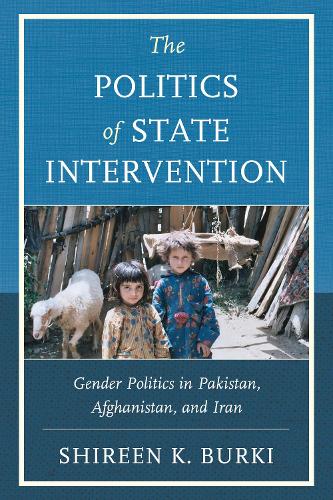
The Politics of State Intervention: Gender Politics in Pakistan, Afghanistan, and Iran
(Paperback)
Publishing Details
The Politics of State Intervention: Gender Politics in Pakistan, Afghanistan, and Iran
By (Author) Shireen Burki
Bloomsbury Publishing PLC
Lexington Books
24th March 2015
United States
Classifications
Professional and Scholarly
Non Fiction
Feminism and feminist theory
305.42095
Physical Properties
Paperback
316
Width 151mm, Height 227mm, Spine 23mm
467g
Description
The Politics of State Intervention: Gender Politics in Pakistan, Afghanistan and Iran examines how three culturally and religiously interconnected neighboring states have sought to regulate the lives of their female populace in order to gauge how successful, or unsuccessful, these efforts have been at the grassroots level. Utilizing a historical framework, it explores the gender specific policies of these states to assess whether or not shared cultural, religious, and social characteristics translate into similar gender policies and outcomes across borders, and if not, why. Through comparison, it conclusively identifies social and political roadblocks that threaten both the long term prospects and security for all females; as well as factors that tend to somewhat ameliorate detrimental tendencies.
Reviews
Burki, 'a female of Pushtun and Irish heritage who grew up in Pakistan,' compares the status of women in her home country with their status in the neighboring Muslim-majority countries of Afghanistan and Iran. She discovers many similarities but concludes that the Pakistani judiciary offers slightly better safeguards for women against the tide of misogynist 'Shariahization' that has swept across all three countries, beginning with Pakistan in the 1970s. Women have been political footballs in battles raging between secularists and Islamists, and imposing literal interpretations of Sharia law has offered cheap gains for politicians seeking backing from conservative public opinion. Feminists were divided between those seeking reforms for Westernized elites and their poor conservative sisters. Burki sensibly concludes that the 'pursuit of unrealistic goals ... based on culturally alien practices' has distracted attention from 'the enactment of laws and the provision of essential services that constitute more realistic and achievable first steps toward female empowerment in the long run' (italics in original). Her study is an excellent source of material for systematic comparisons between weak Muslim-majority states and civil societies, especially those undergoing political transitions and coping with political Islam. Summing Up: Highly recommended. General readers; upper-division undergraduate students and above. * CHOICE *
Author Bio
Shireen K. Burki is a political scientist whose research interests specialize in state-society relations and politics in the Middle East and South Asia. She completed her doctorate in Political Science from the University of Utah in 2007. Burki was an Assistant Professor in Conflict Management of Stabilization and Reconstruction at the National Defense University and has worked in various capacities with the US military and the US government. She has published in various scholarly journals such as Terrorism and Political Violence, Comparative Politics and Journal of Applied Security Research.
